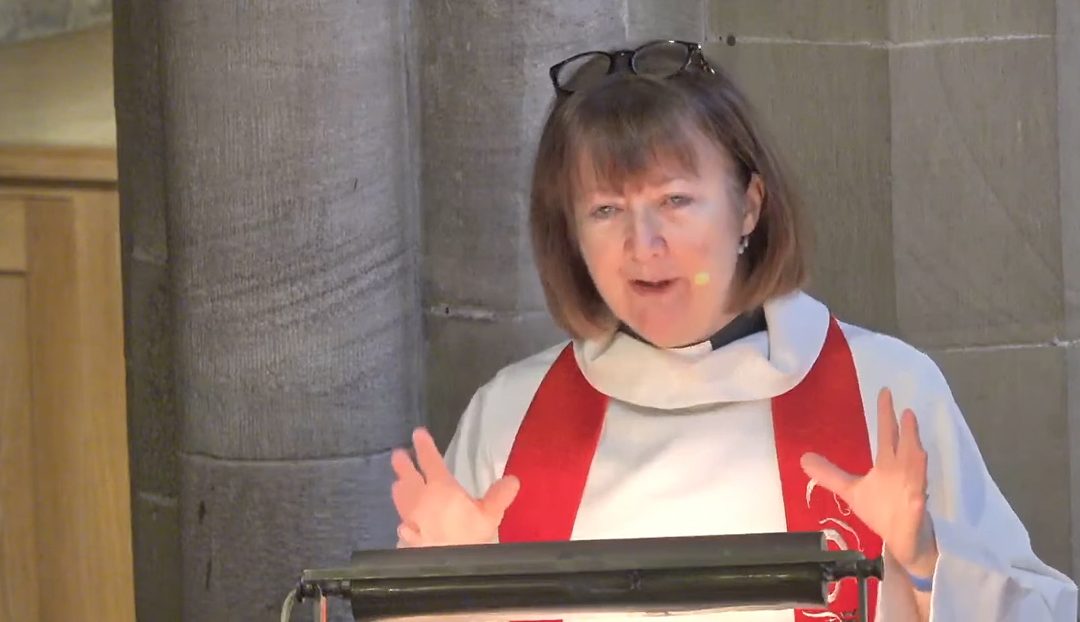Preached by Revd Dr Jo Logan, Reflective Practice Tutor, St Hild College
Just over 80 years ago, many radio listeners heard these words:
If the skies before us are still dark and threatening, there are stars to guide us on our way. Never did heroism shine more brightly than it does now, nor fortitude, nor sacrifice, nor sympathy, nor neighbourly kindness, and with them – brightest of all stars – is our faith in God. These stars will we follow with His help until the light shall shine and the darkness shall collapse.
Those words were spoken by King George VI in his Christmas broadcast of 1941. The King was speaking to people in the middle of what became known as the Blitz. From 1940 to 1942, many British cities were bombed. Here in Bradford the worst night was 31 August 1940 when 116 bombs fell on the city centre. Altogether across the country, more than 43,000 people died and millions were made homeless. It is no wonder that the King spoke of the skies being dark and threatening.
Today, we’re here to remember. To remember the sacrifice and courage of those who have fought, suffered and died as a result of war. And particularly today, because it’s 80 years ago, we might remember the sacrifice and courage of those who endured the bombing raids of the Second World War.
As King George VI put it, if the skies back then were dark and threatening, they were brightened by the ways in which people responded to each other. With courage, with self-denial and with kindness. I’m not suggesting that the Britain of the 1940s was populated entirely by saints. But then, as now, there were people who showed bravery and kindness in the most extreme of circumstances.
There’s a story my Dad used to tell. My Dad grew up in North London during the Blitz. He remembered once being part of a crowd gathered around a bomb crater. There were several badly injured people in the crater, together with an unexploded bomb. Then the local doctor arrived and told people to go and get as many bed sheets as possible to make a rope. A group of people then lowered the doctor down to the injured victims so that he could give them morphine for their pain. All of this was next to the unexploded bomb. My Dad remembered this all his life. The courage of that doctor made such an impression on him.
I think that’s the kind of heroism that the King was thinking of when he made his Christmas broadcast. The memorable acts of great courage amid huge risks. But the King also spoke about other qualities – qualities that were just as memorable for those involved. Sympathy and neighbourly kindness. The small acts of help.
For example, in her wartime diary, Nella Last from Barrow in Furness recalls collecting all the old linen she can for the local hospital to use as bandages. And on a BBC webpage, I read about a wedding in Rotherham, taking place in the gaps between air raids. This is what the groom, Charles Brett, remembered about the reception at a local hotel:
‘How we all got into the room I don’t know – and the meal! Considering we were on extreme rationing, I couldn’t believe the way everybody had contributed to make such a splendid tea.…The vicar said how much he had enjoyed it – I seem to think that two of my mates from Sheffield had laced his tea with a tot or two.’
That gives a whole new angle on the expression ‘more tea vicar’.
Lighter moments, and small acts of help like these, are the ‘stars’ that helped guide people on their way. But, for King George VI, there was one star which shone brighter than all the rest. That was faith in God. And the King expresses his conviction that one day, the light shall shine and the darkness will collapse. I’m struck by how similar this is to the passage we have just heard from St Paul’s letter to the Romans.
Both George VI and St Paul share a conviction that there is a God and that God offers hope for our future. George VI speaks of light defeating darkness. St Paul speaks of love overcoming hardship, distress and persecution. Both are making statements that are at the heart of the Christian faith: There is a God. A God who is ultimately more powerful than any other force.
Among Paul’s words are these: ‘For I am convinced that neither death, nor life, nor angels, nor rulers, nor things present, nor things to come, nor powers, nor height, nor depth, nor anything else in all creation, will be able to separate us from the love of God in Christ Jesus our Lord.’
These words have brought comfort and hope to Christians for nearly 2,000 years. They are a statement of absolute conviction that God’s love will overcome everything else, including death.
St Paul’s conviction reminds me of something said by a survivor of the Second World War – Leonard Wilson, the Bishop of Singapore who later became Bishop of Birmingham. Bishop Wilson was imprisoned in the Far East and tortured. This often left him so weak that he had to be carried back to his cell. Preaching in 1946, he said this,
‘God in all his power and strength and comfort is available to every one of us today. He was revealed to me not because I was a special person, but because I was willing in faith to accept what God gave. I know that it is true not just because the Bible says so or because the Church has told us, but because I have experienced it myself, and whether you are despondent or in joy, whether you are apathetic or full of enthusiasm, there is available for you at this moment the whole life of God with its victory over sin and pain and death.’
I don’t know how you each are today. To draw on George VI’s imagery, I don’t know whether the skies are dark for you, or whether they are bright. If they are dark, then I pray that you may sense the love of Jesus Christ and that this may give you hope. Overall, it seems to me that we have a collective dark sky at the moment. The invasion of the Ukraine and the suffering of its people; the economic situation of this country with so many people worried about how they will afford energy bills or mortgage payments or feed themselves and their children. And the ecological crisis facing our planet, described so vividly at the COP 27 conference in Egypt.
The scale of these events is huge – they can feel like a tide sweeping us along. Our part can feel too small to make a difference. But I think that must have been true in the Second World War too: individual acts couldn’t turn back the tides of bombs. So I’d like to leave you with two thoughts.
The first is this. In the bombed cities of the Second World War, the small acts all made a contribution. In the same way, every step we each take has an effect. Every offer of help to the Ukrainian people, every donation to a foodbank, every attempt to recycle something rather than throw it away. Like Nella Last in Barrow in Furness cutting up strips of old linen or Charles Brett’s neighbours bringing a cake to his wedding, we can all do our bit.
And the second thought is this. In God, and through Jesus Christ, we have hope. It is a hope that sustained King George VI and St Paul; it is a hope confirmed in the experience of Leonard Wilson. So, as we remember today, amid the deep worries of our present time, we might each be encouraged to hold onto this hope. I started with one of George VI’s Christmas broadcasts and I’d like end to another one – this time from 1939. In it, the King used words written by Minnie Haskins, to encourage those listening amid their deep worries. Here are those words, for us too today:
‘I said to the man who stood at the gate of the year: “Give me a light that I may tread safely into the unknown.” And he replied: “Go out into the darkness and put your hand into the Hand of God. That shall be to you better than light and safer than a known way.”’
Amen.

